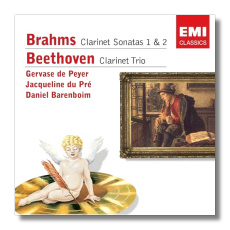
The Internet's Premier Classical Music Source
Related Links
- Latest Reviews
- More Reviews
-
By Composer
-
Collections
DVD & Blu-ray
Books
Concert Reviews
Articles/Interviews
Software
Audio
Search Amazon
Recommended Links
Site News
 CD Review
CD Review
Romantic Chamber Music for Clarinet

- Johannes Brahms:
- Clarinet Sonata in F minor, Op. 120 #1
- Clarinet Sonata in E Flat Major, Op. 120 #2
- Ludwig van Beethoven: Clarinet Trio in B Flat Major, Op. 11
Gervase de Peyer, clarinet
Daniel Barenboim, piano
Jacqueline du Pré, cello
EMI Classics 355674-2 ADD 63:51
This is a new release in EMI's "Encore" series – an older recording that is here reissued at a budget price. The digital remasterings are new, however, and one wouldn't suspect that these recordings came from 1967 (Brahms) and 1970 (Beethoven) unless one read it on the back of the CD booklet.
Brahms had a sort of "clarinet epiphany," one might say, at the end of his life. He became acquainted with clarinetist Richard Mühlfeld, and was so impressed with Mühlfeld's playing that he wrote the Clarinet Trio, and the two Clarinet Sonatas between 1891 and 1894. These were the last chamber works that he was to compose.
Both works are appropriately autumnal, although the second sonata forecasts a warm Indian summer, and closes with a set of variations. All the storms and stresses of the symphonies and the piano concertos have died down. Brahms is left alone with no one but the muse, if you will, and feelings of gratitude not just for Mühlfeld, but for a career in which he accomplished much.
De Peyer – English by nationality, although his parents were of Swiss descent, thus explaining his French-sounding surname – has been one of the world's most famous clarinetists for decades, and has been particularly active performing and recording chamber music. He has recorded the Brahms clarinet sonatas at least twice. This recording features de Peyer's bright tone, slowish tempos, and solid pianism by Barenboim, and most listeners should find it completely satisfying. My preference, however, still rests with a warmer and somewhat later recording by clarinetist George Pieterson and pianist Hephzibah Menuhin, available as part of a two-CD Philips "Duo" set.
If I have just minor reservations about the Brahms, I have none at all about the Beethoven. The addition of Jacqueline du Pré on the "deep end" gives the performance the weight that I find missing in the clarinet sonatas. This is early Beethoven played full-bloodedly, but without aggression. Incidentally, the finale also is a set of variations, this time on a tune taken from a forgotten opera by one Joseph Weigl called L'amor marinaro – which EMI's anonymous booklet note writer felicitously translates as "Sailors in Love." Sounds like a Fassbinder movie, no? Recommended at this price.
Copyright © 2006, Raymond Tuttle




















